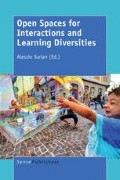Abstract
Transactive communication is defined as referring to and building up on a learning partner’s idea. Thereby, the partner’s idea is transformed into a more elaborate one. Examples for transactive statements are critiquing the partner’s idea, extending the partner’s idea or integrating the partner’s idea with an idea of one’s own.
Access this chapter
Tax calculation will be finalised at checkout
Purchases are for personal use only
Preview
Unable to display preview. Download preview PDF.
References
Antil, L. R., Jenkins, J. R., Wayne, S. K., & Vadasy, P. F. (1998). Cooperative learning: Prevalence, conceptualizations, and the relation between research and practice. American Educational Research Journal, 35, 419–454.
Azmitia, M. & Montgomery, R. (1993). Friendship, transactive dialogues, and the development of scientific reasoning. Social Development, 2, 202–221. Retrieved from http://dx.doi.org/10.1111/j.1467-9507.1993.tb00014.x
Barron, B. (2000). Achieving coordination in collaborative problem-solving groups. The Journal of the Learning Sciences, 9, 403–436. Retrieved from http://dx.doi.org/10.1207/s15327809jls0904_2
Berkowitz, M. W., & Gibbs, J. C. (1983). Measuring the developmental features of moral discussion. Merrill-Palmer Quarterly, 29, 399–410.
Berkowitz, M. W., Althof, W., Turner, V. D., & Bloch, D. (2008). Discourse, developments, and education. In F. Oser & W. Veugelers (Eds.), Getting involved: Global citizenship development and sources of moral values (pp. 189–201). Amsterdam, The Netherlands: Sense Publishers.
Carron, A. V., Widmeyer, W. N., & Brawley, L. R. (1985). The development of an instrument to assess cohesion in sport teams: The group environment questionnaire. Journal of Sport Psychology, 7, 244–266.
Ginsburg-Block, M. D., Rohrbeck, C. A., & Fantuzzo, J. W. (2006). A meta-analytic review of social, self-concept, and behavioral outcomes of peer-assisted learning. Journal of Educational Psychology, 98, 732–749. Retrieved from http://dx.doi.org/10.1037/0022-0663.98.4.732
Hattie, J. (2009). Visible learning. A synthesis of over 800 meta-analyses relating to achievement. Abingdon: Routledge. Retrieved from http://dx.doi.org/10.4324/9780203887332
Jurkowski, S., & Hänze, M. (2010). Soziale Kompetenzen, transaktives Interaktionsverhalten und Lernerfolg: experimenteller Vergleich zweier unterschiedlich gestalteter Gruppenunterrichtsbedingungen und Evaluation eines transaktivitäts-bezogenen Kooperationsskriptes [Social skills, transactive communication, and academic achievement – comparison of different collaborative arrangements and evaluation of scripting transactive communication]. Zeitschrift für Pädagogische Psychologie, 24, 241–257. Retrieved from http://dx.doi.org/10.1024/1010-0652/a000020
Jurkowski, S., & Hänze, M. (2012). F& Hänze, M. (2012). 10-0652/a000020ogie, 24and academic achievement – comparison of different collaborative arrangements and evaluation of scripti [Fostering transactive interaction: Effects of training in transactive interaction on learning results in cooperative learning]. Zeitschrift für Entwicklungspsychologie und Pädagogische Psychologie, 44, 209–220. Retrieved from http://dx.doi.org/10.1026/0049-8637/a000074
Kruger, A. C. (1992). The effect of peer and adult-child transactive discussions on moral reasoning. Merrill-Palmer Quarterly, 38, 191–211.
Kruger, A. C. (1993). Peer collaboration: Conflict, cooperation or both?. Social Development, 2, 165–182. Retrieved from http://dx.doi.org/10.1111/j.1467-9507.1993.tb00012.x
MacDonald, R., Miell, D., & Morgan, L. (2000). Social processes and creative collaboration in children. European Journal of Psychology of Education, 15, 405–415. Retrieved from http://dx.doi.org/10.1007/bf03172984
Mercer, N., & Howe, C. (2012). Explaining the dialogic processes of teaching and learning: The value and potential of sociocultural theory. Learning, Culture, and Social Interaction, 1, 12–21. Retrieved from http://dx.doi.org/10.1016/j.lcsi.2012.03.001
O’Donnell, A. M. (2006). The role of peers and group learning. In P. A. Alexander & P. H. Winne (Eds.), Handbook of educational psychology (pp. 781nal p. Mahwah, NY: Lawrence Erlbaum. Retrieved from http://dx.doi.org/10.4324/9780203874790
Rohrbeck, C. A., Ginsburg-Block, M. D., Fantuzzo, J. W., & Miller, T. R. (2003). Peer-assisted learning interventions with elementary school students: A meta-analytic review. Journal of Educational Psychology, 95, 240–257. Retrieved from http://dx.doi.org/10.1037/0022-0663.95.2.240
Roseth, C. J., Johnson, D. W., & Johnson, R. T. (2008). Promoting early adolescents’ achievement and peer relationships: The effects of cooperative, competitive, and individualistic goal structures. Psychological Bulletin, 134, 223–246. Retrieved from http://dx.doi.org/10.1037/0033-2909.134.2.223
Russell, H. A. (2005). Transactive discourse during assessment conversations on science learning. Retrieved May 15, 2014, from http://scholarworks.gsu.edu/epse_diss/
Schuitema, J., van Boxtel, C., Veugelers, W., & ten Dam, G. (2011). The quality of student dialogue in citizenship education. European Journal of Psychology of Education, 26, 85–107. Retrieved from http://dx.doi.org/10.1007/s10212-010-0038-1
Springer, L., Stanne, M. E., & Donovan, S. S. (1999). Effects of small-group learning on undergraduates in science, mathematics, engineering, and technology: A meta-analysis. Review of Educational Research, 69, 21–51. Retrieved from http://dx.doi.org/10.3102/00346543069001021
van Boxtel, C., & Roelofs, E. (2001). Investigating the quality of students discourse: What constitutes a productive student discourse. Journal of Classroom Interaction, 36, 55–62.
Webb, N. M. (2009). The teacher’s role in promoting collaborative dialogue in the classroom. British Journal of Educational Psychology, 79, 1–28. Retrieved from http://dx.doi.org/10.1348/000709908x380772
Webb, N. M. (2010). Peer learning in the classroom. In P. Peterson, E. Baker, & B. McGaw (Eds.), International encyclopedia of education (Vol. 6, pp. 636–642). Oxford: Elsevier. Retrieved from http://dx.doi.org/10.1016/B978-0-08-044894-7.00616-3
Weinberger, A., & Fischer, F. (2006). A framework to analyze argumentative knowledge construction in computer-supported collaborative learning. Computers & Education, 46, 71–95. Retrieved from http://dx.doi.org/10.1016/j.compedu.2005.04.003
Author information
Authors and Affiliations
Editor information
Editors and Affiliations
Rights and permissions
Copyright information
© 2016 Sense Publishers
About this chapter
Cite this chapter
Jurkowski, S., Hänzea, M. (2016). Fostering Knowledge Co-Construction through Training in Transactive Communication. In: Surian, A. (eds) Open Spaces for Interactions and Learning Diversities. SensePublishers, Rotterdam. https://doi.org/10.1007/978-94-6300-340-7_7
Download citation
DOI: https://doi.org/10.1007/978-94-6300-340-7_7
Publisher Name: SensePublishers, Rotterdam
Online ISBN: 978-94-6300-340-7
eBook Packages: EducationEducation (R0)

